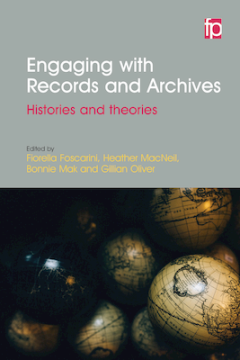
BOOK
Engaging with Records and Archives
Fiorella Foscarini | Heather MacNeil | Bonnie Mak | Gillian Oliver
(2016)
Additional Information
Book Details
Abstract
This collection provides a multifaceted response to today’s growing fascination with the idea of the archive and showcases the myriad ways in which archival ideas and practices are being engaged and developed by emerging and internationally renowned scholars.
Engaging with Records and Archives offers a selection of original, insightful and imaginative papers from the Seventh International Conference on the History of Records and Archives (I-CHORA 7). The contributions in this volume comprise a wide variety of views of records, archives and archival functions, spanning diverse regions, communities, disciplinary perspectives and time periods. From the origins of contemporary grassroots archival activism in Poland to the role of women archivists in early 20th century England; from the management of records in the Dutch East Indies in the 19th century to the relationship between Western and Indigenous cultures in North America and other modern archival conundrums, this collection reveals the richness of archival thinking through compelling examples from past and present that will captivate the reader.
This book will be useful reading for both scholars and practitioners, including archivists, records managers and other media and information professionals. Bridging archival, information, and library science; the digital humanities; art history; social history; culture and media studies; data curation; and communication, students and researchers across the disciplines are sure to find inspiration.
Bonnie Mak PhD is an associate professor at the University of Illinois, jointly appointed in the Graduate School of Library and Information Science and the Program in Medieval Studies. She has previously held the title of Visiting Fellow at the Coach House Institute at the University of Toronto, and is currently Senior Fellow at the Center for Humanities and Information at the Pennsylvania State University. She is the author of How the Page Matters (University of Toronto Press, 2011), and teaches courses in the history and future of the book, reading practices, and knowledge production.
Gillian Oliver PhD is an associate professor at Monash University, Melbourne. Her research interests centre on organisational culture, and the influences this has on the way that information is managed. She is the co-author of Records Management and Information Culture (Facet 2014) and Digital Curation, 2nd edition (Facet 2016) and is Co-editor in Chief of the journal Archival Science.
The diverse papers submitted by eleven authors make challenging reading, so this book will interest academics and can be used as a textbook in history or archives courses. It may also interest records managers and scholars in media studies and history, as well as data curation, art history, library science, and other disciplines.
Paul M. Blobaum
University Library, Governors State University
JMLA
It is a welcome, and almost necessary, addition to the shelves of academic institutions and to those of practicing archivists, especially those wanting to keep up with the developments and issues of their field...It’s not often that such an intellectual book is also eminently approachable. The editors and contributors should be well pleased with their efforts; no doubt readers will be, too.
Harlan Greene
College of Charleston
College & Research Libraries
The editors have compiled a book that is both remarkably open-minded and forward-thinking, while still retaining the rigor of traditional historical and archival practices. Each essay stands firmly on its own yet complements the others in a refreshing way; not unlike when you introduce a favorite piece of music or artwork to someone who has never seen it before and they point out something poignant and meaningful that you had overlooked, adding to the complexity and beauty of your own perspective. Sometimes that new information is hidden in plain view, as several of these essays illustrate, but it brings a more holistic outlook that unites all involved in creating, using, and appreciating that piece. This book accomplishes that for records and makes familiar topics new again, ready to be rediscovered in promising ways.
Christine Schmid Engels
Cincinnati History Library & Archives
Archival Issues
Heather MacNeil PhD is a professor in the Faculty of Information at the University of Toronto where she teaches courses in the areas of archival theory and practice and the history of record keeping. Her research and publications focus on the theory and methods of archival arrangement and description, the trustworthiness of records in analogue and digital environments, and archives and archival finding aids as cultural texts.
...it is certainly the case that the majority of articles are engagingly written, the authors are well-informed and expert commentators, and the topics themselves relevant to many professionals.
Margaret Procter
University of Liverpool
Archives and Records
Fiorella Foscarini PhD is an associate professor in the Faculty of Information at the University of Toronto. She taught previously at the University of Amsterdam and holds a PhD in archival studies from the University of British Columbia in Vancouver. Prior to joining academia, she worked as senior archivist for the European Central Bank in Frankfurt am Main, Germany. She is particularly interested in the nature of records and the activities that shape and are shaped by records. She is Co-editor in Chief of the Records Management Journal.
The cogent discussion of how archives participate in - or are excluded from - power structures and culutral memory, especially in the chapter on "archival silence", will be fascinating to many, especially in today's political climate. The volume includes interesting international perspectives, especially from countries such as Malawi, Italy and Poland.
Felicia J. Williamson
Dallas Holocaust Museum
Library Journal
